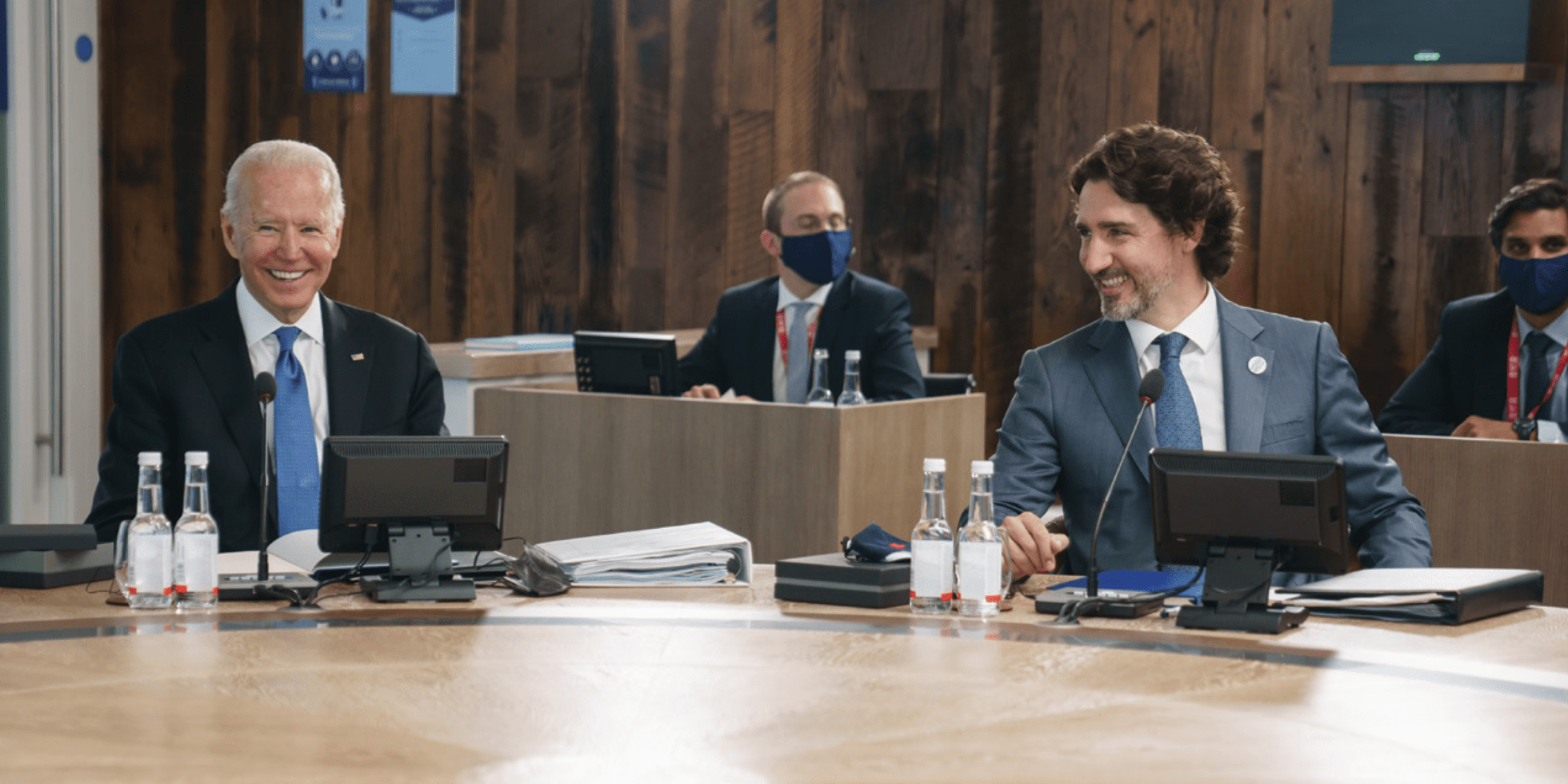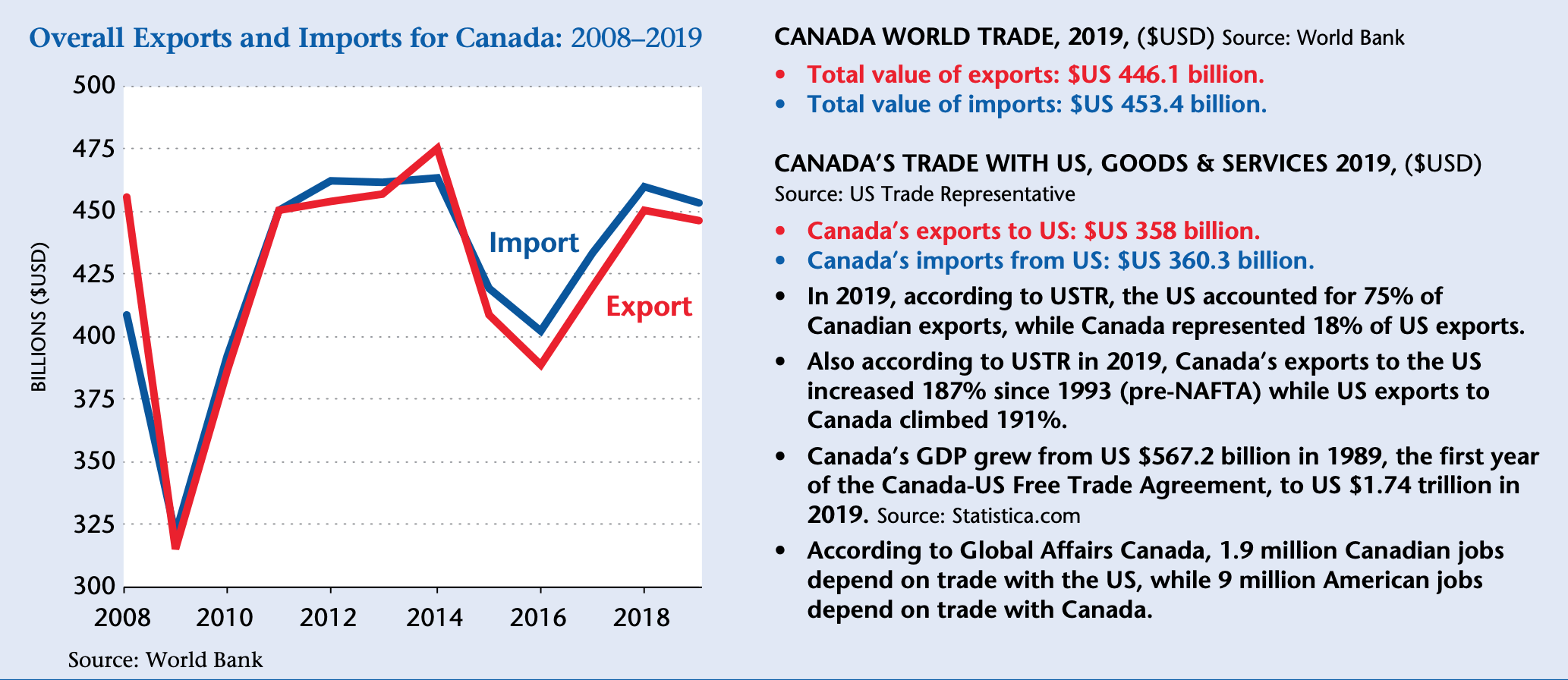Relieved but Cautious: Canada and the Biden Presidency

As with all of Canada’s bilateral relationships, our dealings with the United States are invariably influenced by the domestic political reality facing any American administration. That context includes the Congressional viability of any president’s legislative agenda. Former Canadian Ambassador to the United States Michael Kergin looks at the current elements of that reality, and what it all means moving forward.
Michael Kergin
Well into the first year of Joe Biden’s presidency, the policies of his administration have become more defined. Much less discernible are the chances of their reaching a successful, lasting conclusion. The challenges come not only from the Republican opposition, but from within the president’s own party. The Greek myth of Scylla and Charybdis is relevant: too accommodating to the oppositionist cliffs and Biden loses the progressive wing of the party; steering too near the whirlpool of the party’s progressive activists, he will lose the support of the centrist Democrats.
How this contest between presidential will and congressional resistance is resolved will have implications for Canada. There will, of course, be the perennial issues affecting our trade, energy and environmental relations. The Biden presidency is no different. Irritants will come and go in greater and lesser degrees. This is business as usual with Uncle Sam.
But new threats have arisen that will affect the tenor of our cross-border friendship. These are the attacks against democratic norms rising from within the Republic itself. Serious undermining of America’s democracy will fundamentally change Canadians’ attitudes towards their neighbour with far-reaching consequences.
Many of candidate Biden’s campaign proposals have been converted into early (and possibly temporary) action in the form of executive orders. And with mixed results for Canada.
While Canadians are generally sympathetic to decisions designed to curb climate change, it was a shock for some that this would come at the cost (on the president’s first day!) of canceling Keystone XL. Also causing angst in Ottawa, Queens Park and Quebec City is silence from the White House while the Governor of Michigan, in the name of environmental sustainability, has ordered the shutdown of Enbridge’s Line 5 under the Mackinac Straits.
Most Canadians, certainly at the provincial level, would agree with the general proposition that their tax dollars, dedicated to infrastructure investment, should not be spent for procurement and jobs outside of home. Nevertheless, Biden’s early revival of a Buy American policy by executive order, accompanied by a strict review mechanism of federal procurement tenders, is viewed as a not so friendly gesture. (Such is the paradox of Canada-US relations).
Responding to the Democrats’ labour base, the newly appointed United States Trade Representative (USTR) has subjected the Canada-US-Mexico Trade Agreement (CUSMA) to stringent scrutiny with a view to strengthening protections for US unions. Revisiting the percentage of local content in auto manufacturing, a central component of the agreement, could trigger a real crisis of confidence with the US’s two CUSMA partners.
Bowing to pressure from dairy interests in Wisconsin, USTR has initiated litigation against Canada’s supply management system. This, despite built-in protections in the Canada-US-Mexico Agreement (CUSMA) for Ontario and Quebec dairy farmers—protections which were purchased by our trade negotiators at the price of concessions.
The US Commerce Department has again sued to increase tariffs against softwood lumber (a constant irritant bedeviling our trading relationship since the 18th century). Understandably, this is being vigorously contested by Ottawa, especially at a time when there was a high demand for lumber.
But with the not-so-good news come some welcome changes. Perhaps the most positive development for many Canadians is the return to civility contrasted with the irascibility and unpredictability of the Trump era. The virtual Biden-Trudeau Summit of last April (Biden’s first meeting with a foreign leader) laid out a sophisticated “roadmap” for cooperation over the coming year. Terms such as “partnership”, “align”, “work together” and “coordinate” populate the document.
The leaders have committed to expanding their Canada-US Arctic Dialogue at a time of global warming and more assertive maritime activities by both China and Russia. A longstanding Canadian lobbying effort to revoke oil leases in the Arctic National Wildlife Refuge (ANWR) has succeeded with the signing of a presidential executive order.
In the multilateral space, the Biden presidency has refreshingly aligned itself with traditional Canadian interests: rejoining the Paris Agreement on climate change, re-engaging with the World Trade Organization, pledging renewed support for NATO, and restarting talks with Iran over the nuclear deal—all policies that are walk-backs from Trump’s vision of America First (and alone).
Canada has strongly backed a US initiative within the G7 and G20 to introduce minimum corporate tax measures, thereby removing incentives that have allowed international business to “shop” for tax havens. Biden’s proposal before Congress to raise corporate taxes is also welcome. The reduction of the gap between the countries’ respective tax regimes will benefit Canada as a destination for foreign direct investment.
The White House has not gone much beyond vocal expressions of concern over the imprisonment of the two Michaels. Back-channel efforts are under way by the US Department of Justice to promote a Deferred Prosecution Agreement (DPA) (so far resisted by the Chinese). This could lead to the lifting of the US extradition order against Meng Wanzhou. More evident, and in line with Canadian objectives, have been Biden’s coalition-building efforts to work with like-minded democracies to push back against Chinese mercantilist trade policies and severe human rights violations.

And both leaders are promoting similar post-COVID reconstruction agendas encapsulated by the slogan “Building Back Better”, including Biden’s legislative program of leveraging COVID recovery to invest in infrastructure and social programs. The Liberal budget of last April, like its US counterpart, covers both hard and human infrastructure objectives, requiring levels of expenditures not seen since the Second World War.
It can be argued that Prime Minister Trudeau and President Biden hold similar foreign policy, fiscal and social outlooks.
Former president Trump’s big lie of a “rigged election” has hijacked the Republican party. According to polls, some 74 percent of Republicans believe the election was stolen. In the name of “voting integrity”, 17 Republican-dominated state legislatures (inter alia: Texas, Arizona, Florida, Georgia, Wisconsin) have approved 28 bills, and counting, to restrict hours and physical access to polling booths, to complicate mail-in balloting procedures and to politicize electoral infrastructure by replacing impartial election officials with elected representatives from partisan legislatures.
Democrats at the federal level are fighting back. There is little likelihood that draft bills (HR.1 and S.1) to implement nationwide electoral reforms, such as ending gerrymandering and overhauling campaign financing regulations, will be successful in an evenly divided Congress. Passage requires the removal of the filibuster, whereby just 40 votes can block legislation. (Biden and centrist members of his party have so far resisted backing efforts to do away with the filibuster).
Neither the Senate Republican minority leader, Mitch McConnell, nor his House counterpart, Kevin McCarthy, has publicly distanced himself from the “big lie” of the stolen election. Each has vowed to oppose all majority party-initiated bills largely to ensure that Democrats post no successes before the mid-term 2022 elections.
Trump’s refusal to concede Biden’s victory has fueled extremism of which the January 6 assault on the Capitol has been the most dramatic manifestation. The perpetration of the “big lie”, leading to its broad political endorsement, undermines the fundamental principle of democratic governance: acceptance of electoral results legitimized by the courts.
These are unsettled times in the Great Republic and raise concerns for those Canadians whose values generally remain more centered. JFK’s iconic tag line in praise of the Canada-US relationship (“those whom God has so joined, let no man put asunder”) celebrated in the 1960s, now appears distant and somewhat quaint.
While respite from the previous administration has been liberating, the protectionist instincts of the Biden White House pose immediate challenges to our economic interests. These will require a clear-eyed, pro-active defence from our government leaders and trade negotiators.
Over the longer term, the legislative vulnerability of the Biden agenda and populist threats to democratic institutions are realities which cannot be ignored. The possible election, in 2022, of a Trumpist Congress, and in 2024, of a Trump-friendly presidency, is a clear and future danger.
After the Charlevoix G7 summit in 2018, German Chancellor Angela Merkel was reported to remark that the days when Europe could “completely depend on others are, to a certain extent, over”. Not only has the time come for Canada to hedge its bets by investing more heavily in extra-regional futures, but, more importantly, it is the moment to reinforce our own sovereignty by investing in ourselves.
Michael Kergin, former Canadian Ambassador to the United States and a career foreign affairs official, is a senior advisor to the law firm of Bennett Jones in its Ottawa office.
